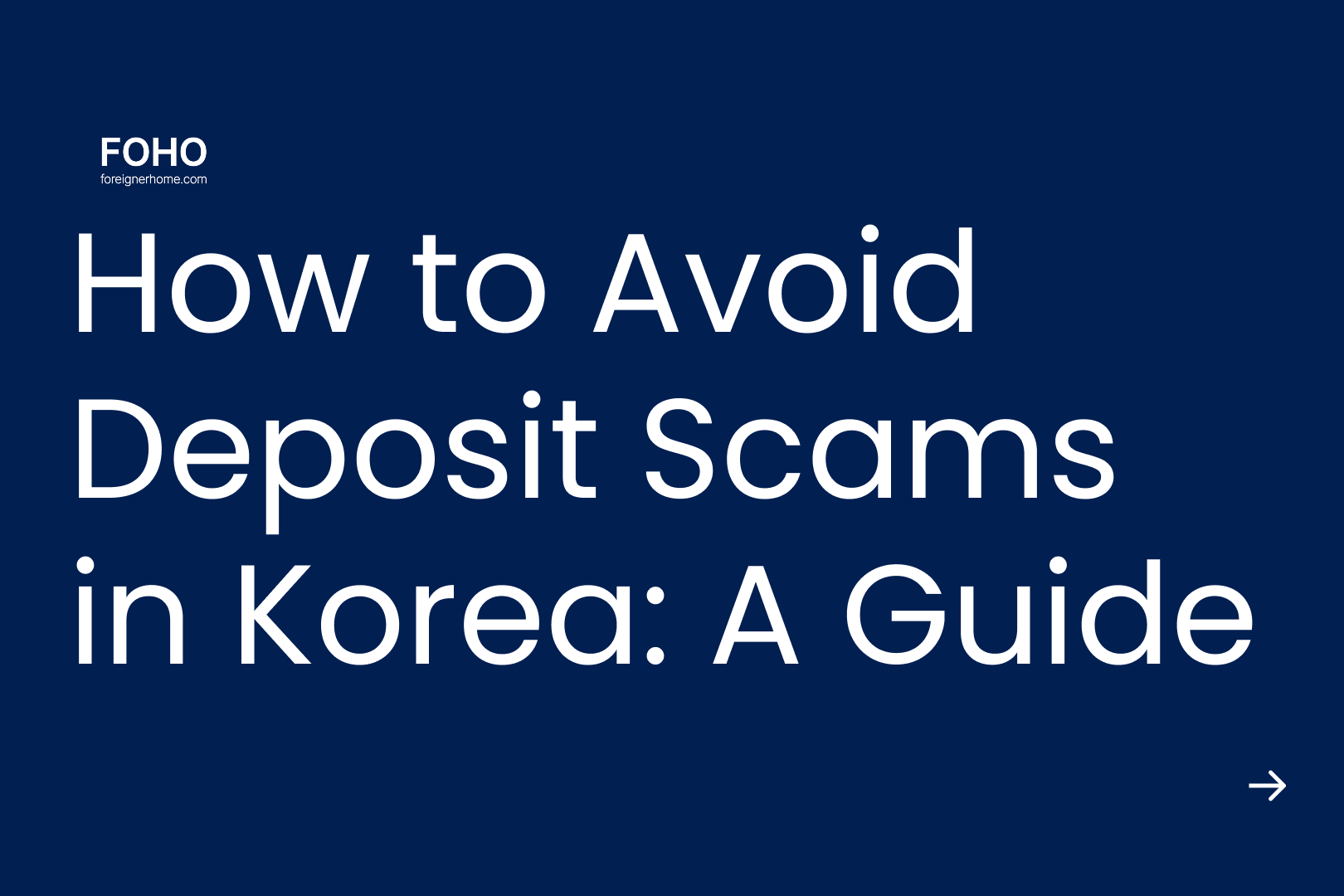FOHO Blog – Global Housing & Living Guide for Foreigners
How to Find Community in Korea as a Foreigner
This guide for expats explains how to make friends in Korea. Learn the pros and cons of Meetup, local clubs, and apps like Somoim.

Table of contents
- 01How to Make Friends in Korea: The Complete Guide to Meetup, Somoim, and Local Clubs
- •Start Here: Understanding Korea’s Social "Rules"
- •Three Ways to Make Friends in Korea: A Comparison
- •Your Digital Toolkit: The Best Apps for Making Friends
- •A Warning: How to Stay Safe While Socializing
- •Conclusion: What's Your Strategy?
How to Make Friends in Korea: The Complete Guide to Meetup, Somoim, and Local Clubs
- Korea’s Social Rules: The unwritten rules you need to know before you start.
- Three Paths to Connection: A comparison of Language Exchanges, Hobby Groups, and Sports Clubs.
- Your Digital Toolkit: The essential apps for finding friends and events.
- Staying Safe: How to spot common scams and manage social burnout.
Start Here: Understanding Korea’s Social "Rules"
1. The Group Comes First
banchan) at dinner to the team-focused nature of work.- What this means for you: Your goal is often to be accepted into a group, not just to make a single "best friend." Building trust with the group as a whole is the key to forming individual friendships within it.
2. Age and Hierarchy Matter
- How you'll see it: People will often ask your age when you first meet to know how to address you. The youngest person at a table is often expected to pour drinks. People are addressed by their titles (e.g.,
Gwajang-nimfor "Manager") rather than first names, unless they are very close friends. Showing respect for this structure is a non-negotiable sign of cultural awareness.
3. Nunchi (눈치): Reading the Room
Nunchi (literally "eye-measure") is the subtle art of situational awareness. It’s about sensing the mood of the group, understanding what is not being said, and reading non-verbal cues to maintain social harmony. A person with "quick nunchi" is considered socially intelligent.- How to practice it: Be observant. Listen more than you speak in new group settings. Pay attention to the group dynamic and be sensitive to others'
kibun(mood or feeling).
4. Soju and Social Lubrication
soju, plays a central role in socializing. Company dinners (hwesik) and social gatherings often involve multiple "rounds" (il-cha for dinner, i-cha for a second bar, etc.). These events are seen as a vital way to break down barriers and build bonds.- Key Etiquette:
- Pour drinks for others, but generally not for yourself.
- When pouring or receiving a drink from an elder, use two hands.
- When drinking with an elder or senior, turn your head away slightly as you sip.
Three Ways to Make Friends in Korea: A Comparison
Method 1: Language Exchanges (e.g., Meetup)
- Pros: They have an extremely low barrier to entry. Being an English speaker makes you a valued participant. They are a great way to meet many people—both Koreans and other foreigners—in a short time.
- Cons: This is the biggest pitfall for many. A large number of attendees are there for cheap or free English practice, not necessarily friendship. Conversations can feel superficial and repetitive ("Where are you from?"). This is often called the "English practice trap."
- Cost: Usually ₩5,000 to ₩10,000 (approx. $4 - $8 USD), often including one drink.
- Strategy: Use language exchanges as a "social starter pack," not an end goal. They are excellent for building initial confidence and meeting other foreigners. Listen for shared interests. If someone mentions hiking, suggest a separate activity: "We should go hiking at Bukhansan together sometime." This moves the connection away from the transactional "English practice" environment.
Method 2: Hobby Groups (e.g., Somoim)
Somoim (소모임), meaning "small meeting," is a Korean app used to organize local clubs for every imaginable hobby, from hiking and cycling to photography and book clubs.- Pros: This is how you find authentic immersion. You connect with Koreans over a genuine shared passion, which completely bypasses the "English practice trap."
- Cons: The language barrier is a major obstacle. You must have high-level to fluent Korean to navigate the app, write a compelling self-introduction, and participate in group chats and offline meetings.
- Cost: The
Somoimapp may have subscription fees for certain features, such as ₩15,500 (approx. $12 USD) per month for a premium pass.
- Strategy: This method is for long-term residents who have invested in learning Korean. When you apply to a group, state your Korean fluency in your introduction. Start with clubs that are less conversation-heavy (like running or photography) to build rapport.
Method 3: Sports Clubs
- Pros: Teamwork creates powerful connections quickly. Clubs provide a structured, recurring social life (practices, games, and post-game meals). It's also a great way to stay healthy.
- Cons: Foreigners report that some local Korean clubs can be "standoffish" or unwelcoming to beginners. Koreans often take their hobbies very seriously, so the atmosphere can be highly competitive. Expat leagues are very welcoming but risk keeping you inside the "expat bubble."
- Cost: Varies widely. A local gym might be ₩50,000/month (approx. $38 USD), while specialized programs like CrossFit can average ₩200,000/month (approx. $154 USD) or more.
- Strategy: Be honest about your goals. If you are a beginner or want a casual, English-friendly environment, start with an expat league (you can find these on Facebook). If you are highly skilled in your sport and speak Korean, trying to join a local team can be a rewarding, immersive experience.
At a Glance: Which Path is Right for You?
Feature | Language Exchange (Meetup) | Hobby Groups (Somoim) | Sports Clubs |
Language Requirement | None; English fluency is an asset. | High proficiency to fluent Korean is essential. | Varies: None for expat leagues; Intermediate to fluent Korean for local clubs. |
Typical Cost | ₩5,000 - ₩10,000 per event. | App subscription fees (₩2,900 - ₩15,500+). Event costs vary. | Monthly memberships: ₩50,000 (local) to ₩280,000+ (high-end). |
Primary Connection | Casual, superficial, and often transient. | Potential for deep, integrated, and long-lasting friendships. | Strong, consistent bonds within a team structure. |
Accessibility | Very High. The easiest starting point. | Very Low. Requires language and cultural study. | High for expat leagues; Low to Medium for local clubs. |
Key Pro | Extremely low barrier to entry. | Authentic immersion based on shared interests. | Powerful bonds through teamwork and regular interaction. |
Key Con | Often feels transactional ("English practice trap"). | Formidable language and cultural barriers. | Local clubs can be unwelcoming; expat leagues can be insular. |
Best Suited For | New arrivals, short-term visitors. | Long-term residents with fluent Korean. | Individuals seeking consistent community and physical activity. |
Your Digital Toolkit: The Best Apps for Making Friends
- Language & Pen Pal Apps (One-on-One):
- HelloTalk & Tandem: The two dominant apps for language exchange. They function like social media for learners, with built-in correction tools. Great for finding one-on-one practice partners.
- Meeff & K-Friends: Marketed for "making Korean friends," these apps often feel like dating apps. Be prepared to filter through many people looking for romance.
- Event & Community Platforms (Groups):
- Meetup: The global standard. Essential for finding English-friendly language exchanges, hiking groups, board game nights, and more, especially in Seoul.
- InterNations: A global community for expats, often attracting long-term professionals. It hosts larger monthly mixers and smaller interest-based groups.
- Somoim & BAND: The Korean-language equivalents.
Somoimis for finding new public hobby clubs.BANDis a private communication app used by existing groups (like a university class or sports team) to organize.
- Expat Lifeline Groups (Facebook): Facebook Groups are the single most vital resource for practical, day-to-day advice.
- Every Expat in Korea: The largest general-purpose group for any question imaginable (visas, banking, travel, etc.).
- Expat Women in Korea: A large, private, and supportive community for women.
- Local Groups: Hyper-local groups like the HBC / Itaewon Information Board are essential for neighborhood-level news and recommendations.
App Comparison
Platform | Category | Primary Function | Key Pro | Key Con |
Meetup | Event Discovery | Find and RSVP to offline group events. | Huge number of English-friendly events. | Event quality can be inconsistent. |
Somoim (소모임) | Hobby Club | Join local, Korean-led hobby groups. | Most authentic way to integrate. | Requires fluent Korean. |
HelloTalk / Tandem | Language Exchange | Connect one-on-one for practice. | Excellent tools for language learning. | Some users use it for dating. |
InterNations | Expat Community | Network with other professionals. | Good for career-oriented expats. | Paid membership; reviews are mixed. |
Facebook Groups | Expat Community | Ask questions and find support. | Indispensable resource for practical advice. | Can be prone to misinformation. |
Meeff / K-Friends | Social Networking | Connect with Koreans interested in foreigners. | Easy to start conversations. | Blurs the line between friendship and dating. |
A Warning: How to Stay Safe While Socializing
Financial Scams: The "Pig-Butchering" Trap
sha zhu pan) targets people experiencing loneliness. Criminals have used this to steal staggering amounts, with reported losses exceeding ₩100 billion (approx. $70 million USD) in just the first nine months of 2025 in Korea.- "Fattening the pig": A scammer (often posing as a local Korean) contacts you on a dating app or social media. They build deep emotional trust over weeks, sending thousands of messages and feigning a romantic relationship.
- The "Investment": Once you are emotionally invested, they introduce a "lucrative" cryptocurrency or investment opportunity. They may let you make a small, "successful" withdrawal to build your confidence.
- The "Butchering": They convince you to invest larger and larger sums. When you try to withdraw your money, the scammer and the fraudulent website disappear.
- Rapid Escalation: They declare their love or talk of marriage after just a few days or weeks.
- Avoids Verification: They consistently refuse to video call or meet in person (common excuses: "my camera is broken," "I'm on a business trip").
- Any Request for Money: Any request for financial help or an "investment opportunity," no matter how plausible.
- Pushes to Private Chat: An insistent push to move the conversation off the app to KakaoTalk or WhatsApp immediately.
Managing Social Fatigue
- Be Persistent: You may have to be the one to initiate plans multiple times. Don't be discouraged by "ghosting"; it's common.
- Language is the Key: Achieving fluency in Korean is often the turning point. It allows you to move beyond "foreigner" topics and connect on a much deeper, more equal level.
General Safety Tips
- Meet in Public: For the first few meetings, always choose a busy, public place.
- Tell a Friend: Let someone know where you are going, who you are meeting, and when you expect to be back.
- Know Your Limits: Drinking culture is strong. Know your own limits and do not feel pressured to keep up.
- Trust Your Instincts: If a person or situation makes you feel uncomfortable, leave immediately.
- Be Careful in Traffic: As a pedestrian, be very cautious. Drivers do not always yield, and motorcyclists sometimes use sidewalks.
Conclusion: What's Your Strategy?
- For Breadth: Use Language Exchanges (Meetup) to cast a wide, shallow net.
- For Depth: Use Hobby Groups (Somoim) to build deep, integrated friendships (requires fluency).
- For Balance: Use Sports Clubs to find a consistent, structured community.
- The Short-Term Exchange Student: Your focus is on experience. Use Meetup and university clubs to meet as many people as possible. Say "yes" to opportunities.
- The Career-Focused Professional: Your focus is on quality. Use InterNations and professional networking events. Consider sports like golf or tennis, which are popular in business.
- The Introvert: Your focus is on structure. Choose activities that reduce the pressure of small talk. Board game meetups, book clubs, or a martial arts dojo are perfect.
- The Long-Term Resident: Your focus is on deep integration. This is the time to master Somoim. Join local clubs and step fully outside the "expat bubble."
Glossary of Korean Terms
- Hwesik (회식): A company dinner, often involving heavy drinking and seen as a team-building event.
- Il-cha (1차), I-cha (2차): "First round," "second round." Refers to the different venues visited during a night out (e.g., 1-cha: dinner, 2-cha: bar, 3-cha: karaoke).
- Kibun (기분): A person's mood or feeling. Maintaining a good
kibunin a group is important for social harmony.
- Nunchi (눈치): "Eye-measure." The subtle art of reading a social situation, sensing others' moods, and understanding unsaid things.
- Soju (소주): Korea's most popular clear, distilled spirit. A staple of social gatherings.
- Somoim (소모임): "Small meeting." A popular Korean mobile app used to find and join local hobby clubs.
FOHO Makes Your Move to Korea Easier
Settle in faster with FOHO
Browse more verified listings and message landlords in minutes. Lock in your lease with FOHO's secure payments.
Get Foreigner-Friendly Housing Tips
Get the latest news delivered to your inbox.

Nov 4, 2025
FOHO Launches Foreigner-Focused Rental Insurance
FOHO’s deposit insurance protects foreign tenants in Korea from landlord defaults. Stay safe with clear coverage and fast claims.

Oct 31, 2025
How to Convert E-9 Visa to E-7-4 in Korea
A guide for Vietnamese & Chinese E-9 workers in Korea. Learn the E-7-4 visa points system, F-2 requirements, and compare GME vs. Sentbe for remittance.

Oct 30, 2025
How to Avoid Deposit Scams in Korea: A Guide
Avoid deposit scams in Korea with our step-by-step guide. Learn to check property debt, understand the 'Deung-gibu,' and secure your deposit.

Oct 29, 2025
Korea Mental Health: NHIS Coverage and Costs
Get help with mental health in Korea. This guide for foreigners explains how to use NHIS, find low-cost options, and get medication prescriptions locally.
Subscribe to the FOHO newsletter
Actionable housing insights in your inbox.